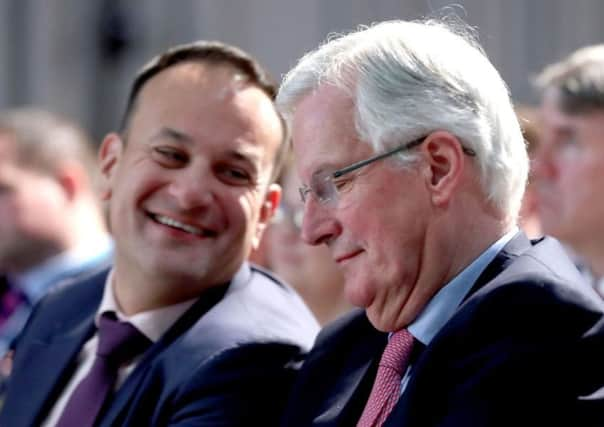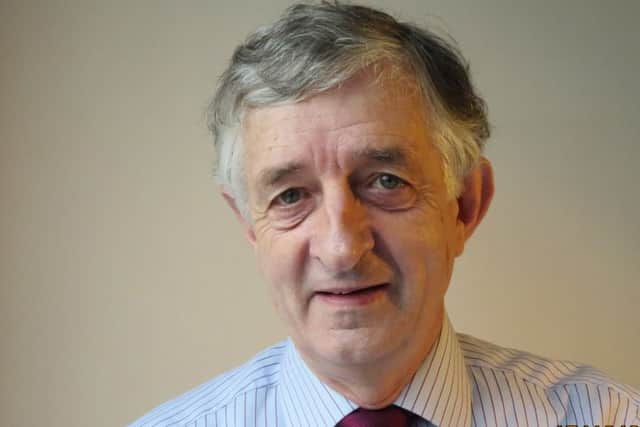Dublin is playing a dangerous game by demanding NI stay in EU customs union and by threatening vetoes


The Irish government, fully backed by Brussels, is threatening to veto any further progress towards an implementation period or trade talks until they have what they see as a satisfactory solution to the Irish border issue.
Both the EU proposal that Northern Ireland remain within the EU customs union, and the UK proposal of a customs partnership have been rejected by the other side.
Advertisement
Hide AdAdvertisement
Hide AdPress reports suggest that the UK government intends to proceed with its customs partnership proposal despite rejections by its own Cabinet committee as well as by the EU.


The threat to pro-Brexit ministers is that the alternative to the customs partnership will be full membership of the EU customs union.
This would meet the aims of the Irish government and the EU to keep the UK within the customs union and hence neutered as a potential competitor with its own tariff and regulatory policies.
A new report, on the Policy Exchange website, outlines how the UK got itself into this difficult position, including the wording of last December’s Joint Progress Report when the UK conceded too much on the Northern Ireland Issue in its anxiety to move onto trade talks.
Advertisement
Hide AdAdvertisement
Hide AdThe lesson of that mistake is that all concessions will be punished, as UK flexibility comes up against EU intransigence.
The main burden of the report is the case that an Irish border without physical infrastructure is fully attainable, and hence that the overly-complex customs partnership is unnecessary.
Arrangements based on the UK’s proposals for an expanded trusted trader scheme and exemptions for small traders will suffice to operate a border without infrastructure.
The additional idea of a ‘cordon sanitaire’ around the whole island for animal health may have additional merit as long as it carries no constitutional implications that unionists would reject.
Advertisement
Hide AdAdvertisement
Hide AdAll of this would be greatly facilitated with the free-trade agreement that the UK wishes to negotiate and which the EU is delaying and frustrating.
The key point is that modern technology means that physical customs posts, or even cameras, are no longer essential at borders.
This is the case made by the EU’s own customs expert, Lars Karlsson, who envisages what he calls a ‘smart border’.
This includes the use of mobile phone and GPS technology to track HGVs, together with the computer-based customs clearing which is the norm across much of the world.
Advertisement
Hide AdAdvertisement
Hide AdComputerised customs clearing consists of declarations of tariff duties payable, including on import content, and also the necessary certification of regulatory approval.
Inspection of animal health and food standards can occur at producers’ premises as at present.
Customs clearance occurs at the exporter’s premises and the sealed consignments can then cross the Irish border while being tracked electronically by customs authorities.
Few additional incentives for smuggling will be in place if there is a free-trade agreement, but smuggling can be further deterred if legislation mandates that all HGVs operating in Ireland carry tracking technology.
Advertisement
Hide AdAdvertisement
Hide AdSupporters of UK membership of the EU customs union assert that no border exists anywhere in the world without some physical infrastructure.
This is true but irrelevant. Mr Karlsson says that arrangements without physical infrastructure have been successfully trialled on the Norway-Sweden border.
The only reason that they have not been adopted for general use on this border is that the existing border arrangements are satisfactory and hence the cost of new electronic systems is not justified.
Our conclusion is that the UK can deliver the promise of no hard border in Ireland without remaining in the EU customs union nor inventing new and complex schemes involving the tracking of individual consignments to their final destination.
Advertisement
Hide AdAdvertisement
Hide AdSince very few consignments are actually checked at existing EU borders, and those checks are usually based on intelligence received, such checks can easily be made away from borders.
The reason for avoiding a hard border is rather to avoid endangering officials charged with erecting, maintaining or operating border infrastructure.
The danger of dissident paramilitaries attacking infrastructure or the associated officials, has been heightened by the over-reaction of opponents of Brexit but precautions are now necessary.
Lord David Trimble in a forward to the report says ‘that anyone interested in the welfare of the people of Northern Ireland … should be urging Brussels to seek a free-trade agreement with the UK and develop a smart border process.
Advertisement
Hide AdAdvertisement
Hide AdThe Irish government is playing a dangerous game by demanding that Northern Ireland remains within the EU customs union and by threatening vetoes.
Ireland more than any EU economy needs free trade with the UK but has made no efforts to promote such an agreement in Brussels.
Indeed, its main effort has been to frustrate moves in this direction.
The priority now should be for the British and Irish sides to return to the co-operative approach last seen under Leo Varadkar’s predecessor, Enda Kenny. Mutually acceptable border arrangements can be devised in the context of the free-trade agreement that Ireland badly needs.
Irish government officials need to resume contacts with their Northern Ireland and GB counterparts to agree a workable solution.
• Graham Gudgin is an economist and former advisor to David Trimble